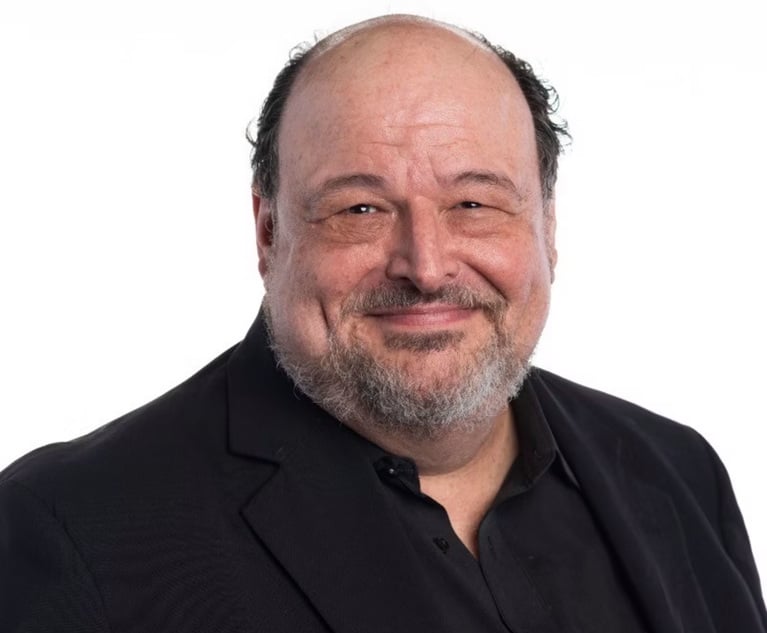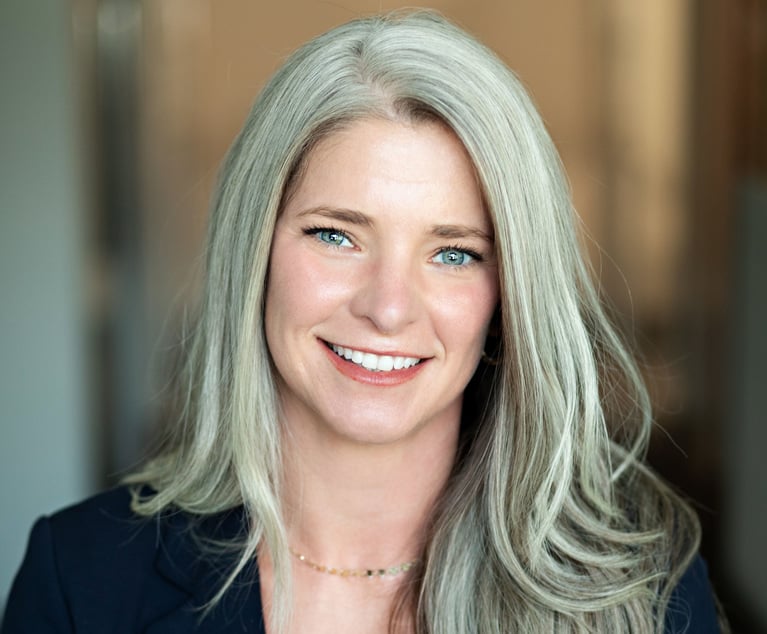Law Firm Generation Flaps
At law firms, where the billable hour still reigns supreme, the idea of work-life balance during the early years of practice is tough for some ...
January 31, 2010 at 07:00 PM
20 minute read
At law firms, where the billable hour still reigns supreme, the idea of work-life balance during the early years of practice is tough for some senior attorneys to grasp.
“If you're going to represent clients like we have, you need to be able to go through the boot camp of learning to be a lawyer,” says J. Daniel Hull, a partner at Hull McGuire. “During the first six or seven years, you really do need to sacrifice a little bit.”
During the past four years, Hull says he has witnessed a dramatic downturn in the hours young attorneys willingly put into projects. Last summer, for example, an associate left the office just hours before a project's completion because, Hull says, the associate felt he'd put in his share of time.
While that may seem to be an individual as opposed to a generational issue, Hull disagrees. “One of the things you don't see in people in their 20s and 30s to an extent is an immersion in their work: 'I really want to do this. I want to do this like I've never wanted to do anything in my life,'” he says.
When she was applying to firms, Deborah Mason, a second-year associate at Ropes & Gray, considered work-life balance a factor in accepting a position. But soon her desire for balance rapidly shifted in favor of work. She's now accustomed to the long hours associated with life at a New York firm, both in the office and beyond, noting that she commonly gets after-hours e-mails on her BlackBerry that she responds to promptly.
“When I was interviewing for jobs, we joked you were looking for someone you could be in the office with at one in the morning,” she says. “Those of us graduating in my class had realistic expectations that you're going to have late hours.”
William Steinhaus, managing shareholder of Ogletree Deakins' Atlanta office, says that in the early 2000s, associates wanted greater work-life balance. But in recent years, that trend has reversed. He says he now finds associates actually prefer to be incredibly busy.
“Our current associates seem much more focused on working harder and gaining experience,” he says. “Most are very eager to spend additional time in client development activities. I find this group to be successfully meeting our expectations.”
Many firms, Ogletree Deakins included, are re-evaluating their models–not only because the law firm compensation model is facing so much scrutiny but also because of the different work outlook Gen Y associates bring to the office. Ann-Marie Neville, managing director of the associate group at Major, Lindsay & Africa, a placement firm, says that law firms are enacting programs that allow for both flexible schedules and a greater choice in the type of work associates get to do.
“[Millennials] are much more accustomed to being in the driver's seat,” she says. “Parents give kids a lot more say and want them to be who they want to be, so they're accustomed to having greater power in what their day entails–and they expect to have that same control when they graduate from law school.”
At law firms, where the billable hour still reigns supreme, the idea of work-life balance during the early years of practice is tough for some senior attorneys to grasp.
“If you're going to represent clients like we have, you need to be able to go through the boot camp of learning to be a lawyer,” says J. Daniel Hull, a partner at Hull McGuire. “During the first six or seven years, you really do need to sacrifice a little bit.”
During the past four years, Hull says he has witnessed a dramatic downturn in the hours young attorneys willingly put into projects. Last summer, for example, an associate left the office just hours before a project's completion because, Hull says, the associate felt he'd put in his share of time.
While that may seem to be an individual as opposed to a generational issue, Hull disagrees. “One of the things you don't see in people in their 20s and 30s to an extent is an immersion in their work: 'I really want to do this. I want to do this like I've never wanted to do anything in my life,'” he says.
When she was applying to firms, Deborah Mason, a second-year associate at
“When I was interviewing for jobs, we joked you were looking for someone you could be in the office with at one in the morning,” she says. “Those of us graduating in my class had realistic expectations that you're going to have late hours.”
William Steinhaus, managing shareholder of
“Our current associates seem much more focused on working harder and gaining experience,” he says. “Most are very eager to spend additional time in client development activities. I find this group to be successfully meeting our expectations.”
Many firms,
“[Millennials] are much more accustomed to being in the driver's seat,” she says. “Parents give kids a lot more say and want them to be who they want to be, so they're accustomed to having greater power in what their day entails–and they expect to have that same control when they graduate from law school.”
This content has been archived. It is available through our partners, LexisNexis® and Bloomberg Law.
To view this content, please continue to their sites.
Not a Lexis Subscriber?
Subscribe Now
Not a Bloomberg Law Subscriber?
Subscribe Now
NOT FOR REPRINT
© 2024 ALM Global, LLC, All Rights Reserved. Request academic re-use from www.copyright.com. All other uses, submit a request to [email protected]. For more information visit Asset & Logo Licensing.
You Might Like
View All
'The Show Must Go On': Solo-GC-of-Year Kevin Colby Pulls Off Perpetual Juggling Act

Contract Software Unicorn Ironclad Hires Former Pinterest Lawyer as GC
2 minute read
How Amy Harris Leverages Diversity to Give UMB Financial a Competitive Edge
5 minute read
Auditor Finds 'Significant Deficiency' in FTC Accounting to Tune of $7M
4 minute readTrending Stories
- 1Gibson Dunn Sued By Crypto Client After Lateral Hire Causes Conflict of Interest
- 2Trump's Solicitor General Expected to 'Flip' Prelogar's Positions at Supreme Court
- 3Pharmacy Lawyers See Promise in NY Regulator's Curbs on PBM Industry
- 4Outgoing USPTO Director Kathi Vidal: ‘We All Want the Country to Be in a Better Place’
- 5Supreme Court Will Review Constitutionality Of FCC's Universal Service Fund
Who Got The Work
Michael G. Bongiorno, Andrew Scott Dulberg and Elizabeth E. Driscoll from Wilmer Cutler Pickering Hale and Dorr have stepped in to represent Symbotic Inc., an A.I.-enabled technology platform that focuses on increasing supply chain efficiency, and other defendants in a pending shareholder derivative lawsuit. The case, filed Oct. 2 in Massachusetts District Court by the Brown Law Firm on behalf of Stephen Austen, accuses certain officers and directors of misleading investors in regard to Symbotic's potential for margin growth by failing to disclose that the company was not equipped to timely deploy its systems or manage expenses through project delays. The case, assigned to U.S. District Judge Nathaniel M. Gorton, is 1:24-cv-12522, Austen v. Cohen et al.
Who Got The Work
Edmund Polubinski and Marie Killmond of Davis Polk & Wardwell have entered appearances for data platform software development company MongoDB and other defendants in a pending shareholder derivative lawsuit. The action, filed Oct. 7 in New York Southern District Court by the Brown Law Firm, accuses the company's directors and/or officers of falsely expressing confidence in the company’s restructuring of its sales incentive plan and downplaying the severity of decreases in its upfront commitments. The case is 1:24-cv-07594, Roy v. Ittycheria et al.
Who Got The Work
Amy O. Bruchs and Kurt F. Ellison of Michael Best & Friedrich have entered appearances for Epic Systems Corp. in a pending employment discrimination lawsuit. The suit was filed Sept. 7 in Wisconsin Western District Court by Levine Eisberner LLC and Siri & Glimstad on behalf of a project manager who claims that he was wrongfully terminated after applying for a religious exemption to the defendant's COVID-19 vaccine mandate. The case, assigned to U.S. Magistrate Judge Anita Marie Boor, is 3:24-cv-00630, Secker, Nathan v. Epic Systems Corporation.
Who Got The Work
David X. Sullivan, Thomas J. Finn and Gregory A. Hall from McCarter & English have entered appearances for Sunrun Installation Services in a pending civil rights lawsuit. The complaint was filed Sept. 4 in Connecticut District Court by attorney Robert M. Berke on behalf of former employee George Edward Steins, who was arrested and charged with employing an unregistered home improvement salesperson. The complaint alleges that had Sunrun informed the Connecticut Department of Consumer Protection that the plaintiff's employment had ended in 2017 and that he no longer held Sunrun's home improvement contractor license, he would not have been hit with charges, which were dismissed in May 2024. The case, assigned to U.S. District Judge Jeffrey A. Meyer, is 3:24-cv-01423, Steins v. Sunrun, Inc. et al.
Who Got The Work
Greenberg Traurig shareholder Joshua L. Raskin has entered an appearance for boohoo.com UK Ltd. in a pending patent infringement lawsuit. The suit, filed Sept. 3 in Texas Eastern District Court by Rozier Hardt McDonough on behalf of Alto Dynamics, asserts five patents related to an online shopping platform. The case, assigned to U.S. District Judge Rodney Gilstrap, is 2:24-cv-00719, Alto Dynamics, LLC v. boohoo.com UK Limited.
Featured Firms
Law Offices of Gary Martin Hays & Associates, P.C.
(470) 294-1674
Law Offices of Mark E. Salomone
(857) 444-6468
Smith & Hassler
(713) 739-1250






